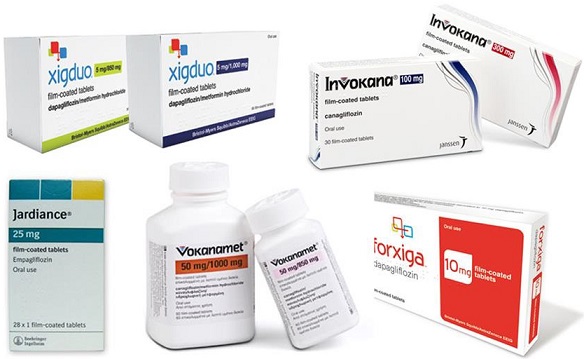COVID-19 Drugs: SGLT2 Inhibitors Do Not Improve Survival In Hospitalized COVID-19 Patients, New Study Shows
Nikhil Prasad Fact checked by:Thailand Medical News Team Aug 31, 2023 1 year, 7 months, 3 weeks, 4 days, 33 minutes ago
COVID-19 Drugs: In the ongoing battle against the COVID-19 pandemic, researchers have been relentlessly searching for treatments that can alleviate the severity of the disease and improve patient outcomes. Sodium glucose co-transporter-2 (SGLT2) inhibitors, known for their cardiovascular and kidney-protective effects in patients with conditions like type 2 diabetes, heart failure, and kidney disease, emerged as potential candidates for aiding COVID-19 patients. However, a recent groundbreaking study presented at the ESC Congress 2023 challenges the assumption that SGLT2 inhibitors might be the game-changer we hoped for in the context of COVID-19.
https://www.escardio.org/Congresses-Events/ESC-Congress

Many pharma giants were actively promoting the use of SGLT2 Inhibitors during the COVID-19 crisis claiming that it helped with COVID-19 prevention and even with COVID-19 recovery despite lack of validating data.
The
COVID-19 Drugs study, which aimed to investigate the potential benefits of SGLT2 inhibitors in patients hospitalized with COVID-19, delivered unexpected results. Contrary to expectations, the research demonstrated that SGLT2 inhibitors did not lead to a decrease in 28-day all-cause mortality compared to the standard care or placebo.
The study, which was conducted by the World Health Organization (WHO) Rapid Evidence Appraisal for COVID-19 Therapies (REACT) Working Group, analyzed aggregate data from randomized controlled trials involving SGLT2 inhibitors and their effects on COVID-19 patients.
SGLT2 inhibitors have been the focus of interest due to their ability to modulate the pathobiology often associated with severe COVID-19 cases. These inhibitors are known to target dysregulated immune responses, endothelial damage, microvascular thrombosis, and inflammation, all of which are key players in the progression of the disease. Moreover, these inhibitors have shown promise in offering cardiovascular protection and preventing the worsening of kidney disease, making them potential candidates for mitigating the complications arising from COVID-19.
One of the notable trials in this domain was the DARE-19 trial, which initially indicated the safety of SGLT2 inhibitor dapagliflozin in COVID-19 patients with cardiometabolic risk factors. However, the trial lacked the statistical power needed to assess certain critical outcomes, such as total mortality.
Recognizing the need for more conclusive data on the efficacy of SGLT2 inhibitors in COVID-19 patients, the REACT Working Group embarked on a comprehensive analysis.
The meta-analysis included data from three significant trials: DARE-19, RECOVERY, and ACTIV-4A. Collectively, these trials enrolled 6,096 participants from various countries, including the US, UK, Brazil, Canada, and more. The participants' age averaged between 62 to 73 years, with a significant proportion having type 2 diabetes at the start of the trials. The researchers meticulously examined the impact of SGLT2 inhibitors on the primary outcome, which was 28-day all-cause mortality, as well as secondary endpoints and safety me
asures.
At the end of the 28-day period, the results were clear - there was no substantial reduction in all-cause mortality among patients who received SGLT2 inhibitors compared to those who received standard care or placebo.
The summary odds ratio (OR) for SGLT2 inhibitors was 0.93, with a confidence interval that included 1.00, indicating no statistically significant difference. This translated to an absolute mortality risk of 11.7% for patients on SGLT2 inhibitors, as opposed to an assumed risk of 12.4% for those on standard care or placebo.
The study also delved into secondary endpoints, like in-hospital and 90-day all-cause mortality, as well as complications such as acute kidney injury and the need for invasive mechanical ventilation. Interestingly, the results for these endpoints were consistent with the primary outcome, with no remarkable advantage observed in the SGLT2 inhibitor group.
Regarding safety, the study found that the incidence of serious adverse events was balanced between the groups receiving SGLT2 inhibitors and those on standard care or placebo. This suggests that SGLT2 inhibitors do not pose an elevated risk in terms of safety in the context of COVID-19 treatment.
Dr Mikhail Kosiborod, the lead author of the study and affiliated with Saint Luke's Mid America Heart Institute in Kansas City, emphasized the significance of these findings. He highlighted that the analysis, encompassing over 6,000 patients hospitalized with COVID-19, offers compelling evidence that SGLT2 inhibitors do not bring about a meaningful reduction in 28-day all-cause mortality or any notable improvements in the predetermined efficacy outcomes.
Dr Kosiborod's statements underscore the clinical implications of the study's results. In light of the findings, the routine use of SGLT2 inhibitors in the management of hospitalized COVID-19 patients does not appear to be supported. It's important to note that the study did not uncover any new safety concerns related to the use of SGLT2 inhibitors in this specific patient population.
This study not only contributes significantly to our understanding of potential COVID-19 treatments but also highlights the importance of rigorous evaluation of proposed interventions. As the medical community continues to grapple with the complexities of the pandemic, evidence-based research remains pivotal in guiding clinical decisions and optimizing patient care. The results of this study, while not aligning with earlier hopes, provide crucial insights that help refine our strategies in the ongoing fight against COVID-19.
The study findings will be published in coming weeks in a leading peer reviewed journal.
For the latest on
COVID-19 Drugs, keep on logging to Thailand Medical News.
